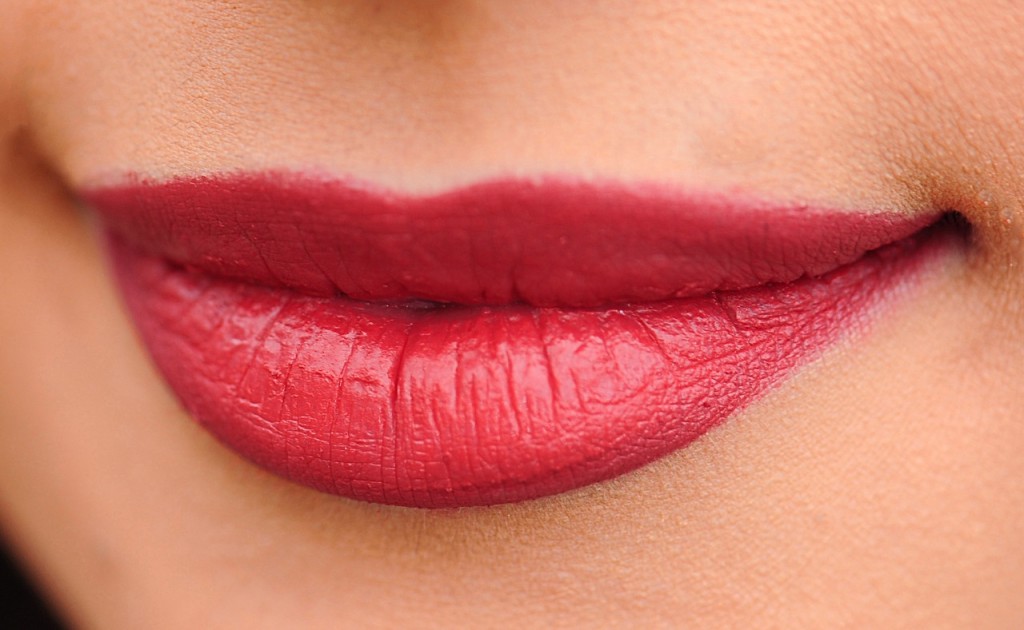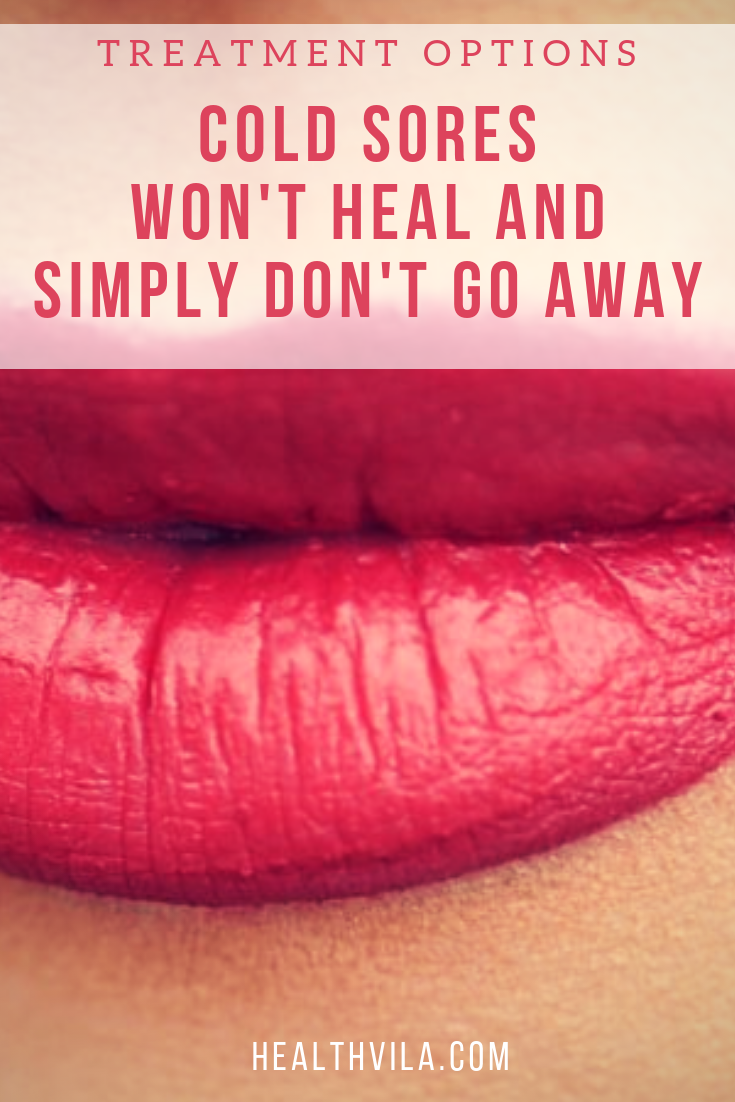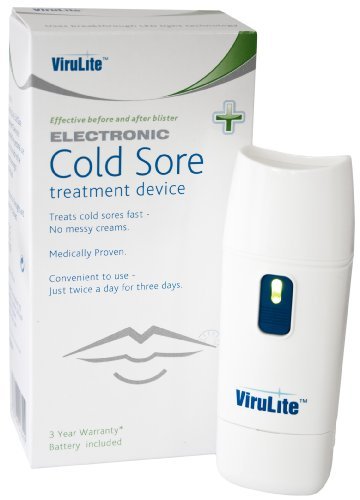
It’s okay to admit it:
You hate those unsightly blisters around your lip, and they hurt really bad.
You are desperate for a fast solution to get rid of them, but your cold sore won’t heal and simply not going away.
So what can you do, and how long do cold sores last?
Why Cold Sore Won’t Heal… and Not Going Away?
According to Mayo Clinic and eMedicine Health:
- Cold sores, also known as fever blisters, are typically caused by a virus called Herpes Simplex Virus type 1 (HSV-1). The virus enters the skin or mucous membrane, normally through small breaks or cracks, and then reproduces to cause cold sores.
- The signs and symptoms of this viral infection can take 2 to 3 weeks to heal completely.
- The HSV virus then lies dormant in nerve tissues, and may reactivate to cause new cold sores and symptoms at the same place as before.
There could be varying reasons why your cold sore won’t heal, not going away, or keep on recurring — with below are some common causes and triggering factors:
- Illnesses like colds, fever, flu, and coughing could cause a person to experience cold sores.
- Female patients may experience cold sores during menstruation.
- Stress and depression have also been identified as some of the likely causes of cold sores.
- Exposure to direct sunlight could stimulate the virus to cause a break out in some patients.
When you have cold sores that don’t heal as fast as you wish:
What are the treatment options to relieve your pain, until the fever blisters go away for good?
And what are the foods to avoid during this time period, to prevent worsening of your agony?
#1: Electronic Cold Sore Treatment Devices
The use of modern technology has made it possible for innovative medical tools to be developed for the treatment of cold sores. Based on user reviews, most of the time, these electronic devices are effective to provide fast relief and get rid of cold sores.
As these electronic devices are mainly battery-operated and thus re-usable for repeat treatment, they can become especially handy when your cold sores can’t heal and keep coming back.
- Lipzor cold sore zapper: One of the unique features of this product is that it can be used to treat cold sores at any stage of the breakout. It works by generating a waveband of light rays projected at the affected part of the skin. This light improves the skins healing system hence causing any developing fever blisters to stop.
- Virulite: An over the counter product that has been approved by the US Food and Drug Administration (FDA) for cold sores treatment. As one of the best cold sore treatment products, Virulite emits light rays at a waveband of 1072 nm which increase the effectiveness of the body’s immune system to resist the further development of cold sores.
>> Visit Virulite Official Website to Learn More - VyZapp Viral Inhibitor: A device that has been developed and made in the U.S.A. for the treatment of cold sores and blisters. It emits beta waves which act against cold sores to prevent eruptions.
- Herpotherm: This equipment was developed and vetted in Germany. It is used to prevent the spread of Herpes Simplex Virus. Herpotherm generates heat energy between 50 – 51 degree celsius when used on the affected area of the skin to prevent further spread of herpes virus.
#2: Oral Prescription / Over The Counter Medicines
Cold sores usually heal within 7 to 10 days. If you notice there are no improvements after this time or a spread of the blisters to other areas of your body, please seek the attention of a doctor.
Oral antiviral drugs are commonly used by doctors to treat patients experiencing an outbreak of cold sores. These drugs work by stopping the multiplication of the virus, creating an opportunity for the skin to have a fighting chance against the virus. These drugs facilitate the action of the patient’s immune system which causes the virus to return to a latent state.
The fact is, people can have different responses to drugs, so the results can vary between people or for the same person on a different occasions.
When a certain cold sore medication does not work on you, with your cold sore won’t heal and simply not going away, then it’s recommended that you try an alternative medicine.
Doctors have also suggested that people who experience cold sore in the interval of 2 to 3 months should consider taking small doses of antiviral drugs to reduce the frequency of the outbreaks, and eventually stop it.
The common doctor prescribed oral drugs used to treat patients with cold sores include:
- Acyclovir (Zovirax) tablets: This antiviral drugs are fast acting, they tend to increase the time within which the patient will feel some relief from pain caused by the cold sores. The reported side effects from the use of this drug include nausea, diarrhea, and headache.
- Famciclovir (Famvir): This drug has been proven to have potent properties that are active against the herpes virus which causes cold sores and genital herpes. The recommended method of administration of this drug is to be taken orally. The side effects patients have reported after using Famciclovir has made the health authorities place regulations that specify Famciclovir should only be used when prescribed by a doctor. The side effects include itching, fever, headache, fatigue, nausea or diarrhea.
- Valacyclovir (Valtrex): Available as capsules and it is highly recommended that only patients with a doctor’s prescription should use Valacyclovir for the treatment of cold sores. Doctors have generally implied that valacyclovir is easier to be absorbed by the body, this makes it the preferred choice. Reported side effects include itching, skin rash, allergic reactions, headache, dizziness, insomnia, and fatigue.
The following groups of people should seek the advice of a physician before using valacyclovir; children, pregnant women, people living with HIV and people who have previously undergone medical procedures like kidney transplant, or bone marrow transplant.
Oral cold sore pills are also available to buy over the counter, with the most popular brands / products include:
- HERP RESCUE
- Quantum Super Lysine
- Hyland’s Cold Sores & Fever Blisters Relief Tablets
- Amazing Nutrition Amazing Formulas L-Lysine
#3: Topical Medication and Antibiotic Ointment
There are recommended antiviral creams that can be topically used for the treatment of cold sores. These creams have the potency to slow down the progress of cold sores and blisters while reducing the time the patient will take to experiencing healing. Topical antiviral creams have also been used alongside antibiotic creams which prevent infections from common bacteria found on the skin.
A case of secondary bacterial infection is diagnosed when there is an eruption of the cold sore blisters; this makes other parts of the skin around the eruption vulnerable. The antibiotic cream should be used after the topical antiviral cream has been applied to treat the cold sores.
Abreva (docosanol) – this is one of the commonest topical antiviral creams potent against cold sores. It is sold over the counter and it effectively reduces the pain and itching while causing a speedy healing of the skin areas affected by cold sores. The recommended application is five times daily, and treatment should start immediately a cold sore has been spotted. Treatment should be continued until the cold sores heal.
Foods To Avoid / Eat When You Have Cold Sores
Cases have been reported where fever blister take a little longer than normal to heal. If you find yourself in a similar situation that you cold sore bumps won’t go away, the following tips will help you cope with this ordeal when you have cold sores:
- At this time, avoid foods that have high composition of arginine, with foods to avoid include turkey, pumpkin seeds, soybeans, chocolate, squash, and peanuts. These food contain Arginine that promotes the replication of the Herpes Simplex Virus (HSV) which is the common cause of cold sores.
- Also avoid eating salty and acidic foods like beef, sugar, crisps, beer, lemon etc because they cause the cold sores to get worse.
- Eat more foods rich in Lysine (and low in arginine), such as yogurt, fish (especially flounder), apples, apricots, and pears. More tips from Dr Doug Willen in video below.
Other things to take note when you have cold sores:
- If you have to touch the cold sore blisters during treatment, wash your hands very well afterward to prevent the virus from spreading.
- Avoid the use of makeup because your make up tools can get contaminated with the virus.
- Keep the affected parts of your skin away from moisture as much as possible. The dryness causes the blisters to dry up quickly and fall off.
- Cold sores are contagious, so you should avoid physical contact like kissing or oral sex.
- Keep your toothbrush in a dry place. We already know that the virus thrives in moisture so you should ensure that your toothbrush is always properly dried to eliminate any virus that might have gotten on it.
Beware of Recurring Fever Blisters
Many people have been infected by the herpes simplex virus however, the virus remains in a latency state after the first outbreak. It is rather unfortunate that some people still record outbreaks of cold sores caused by the herpes virus very often, with cold sores coming back around their mouths and nose when the virus becomes re-activated.
Dr. Schultz elaborates on “What Causes Cold Sore – When Are Cold Sores Contagious” in brief video below, for you to learn more about fever blister and hopefully prevent the recurrence by avoiding the potential cold sore triggers.

